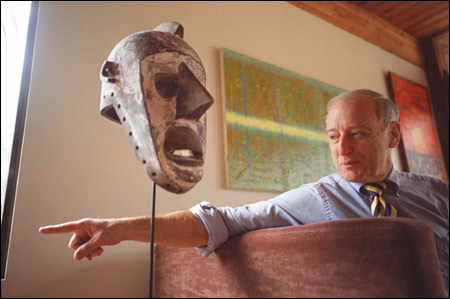KSG works to improve leadership
KSG’s Rotberg helped facilitate African leadership effort

A Kennedy School expert on democracy and leadership in the developing world is assisting a new African effort to improve leadership on the continent by training young leaders and drawing inspiration from current and former best practices and success stories.
Robert I. Rotberg, director of the Belfer Center’s Program on Intrastate Conflict and Conflict Resolution, has been named the first interim executive secretary of the effort, called the African Leadership Council.
Rotberg, who has been studying governments and leaders in Africa and elsewhere for 40 years, played a key role in convening the leaders who would make up the council last May at a private conference at the Kennedy School of Government (KSG).
That first meeting found surprising unanimity among experts and observers of African politics and practicing leaders there. The consensus was that steps needed to be taken to strengthen leadership across the continent.
At that first meeting, at a second meeting in October in Botswana, and a third in March in Kenya, the group discussed how best to achieve that goal.
What resulted was the Mombasa Declaration, which set out the group’s principles, a 23-point Code of African Leadership, and an African Leadership Council mission statement. The council also asked Rotberg to assume the mantle of the group’s first executive secretary.
Rotberg said the post is an interim one that will be mainly focused on getting the organization up and running, identifying funding sources, and preparing for a move to headquarters in Botswana with the appointment of Rotberg’s successor, probably within a year.
“This is an attempt to give the African people the good leadership that they deserve,” Rotberg said.
Rotberg said the council intends to emphasize what leaders can do for their people, not for themselves and their associates. The council envisions a role as outspoken advocates for good governmental practices and as a resource to help avoid or resolve conflicts.
The council’s founding members all have a reputation for integrity, Rotberg
‘My 10-year dream is that there will be approximately 200 young African leaders who have grown out of the training program at the Kennedy School to become major public-spirited democratic leaders …’
– Robert I. Rotberg, Director of the Belfer Center’s Program on Intrastate Conflict and conflict resolution
said. The council is headed by former Botswana President Sir Ketumile Masire. Other members include the current vice president of Kenya, Moody Awori; the former head of Nigeria, Gen. Yakubu Gowon; as well as the former prime ministers of Namibia and Somalia; the speaker of the East African Legislative Assembly; and other current and former high-ranking officials from Malawi, Zimbabwe, Sierra Leone, and Kenya. The foreign minister of Uganda was a member as well, until his death last month. Additional members from the rest of Africa, especially women, will be asked to join the council.
The group’s Code of African Leadership includes basic democratic principles such as respecting human rights and the rule of law, as well as freedoms of religion, of the press, and of assembly. The code also includes other tenets of good government, such as not using office for personal gain, avoiding corruption, being respectful of dissent, and respecting the separation of powers between the executive, legislative, and judicial branches of government.
A crucial part of the council’s activities will take place not in Africa, however, but at the Kennedy School. Rotberg said the council seeks to encourage the creation of an executive education program aimed at African leaders. The program, he said, would invite young elected leaders for a two-week program that will be geared toward teaching leadership, ethics, and the principles of good democratic governance.
While Rotberg said he expects the council itself to grow and become a louder voice for good governance in Africa, the executive education program will hopefully begin to improve leadership from the inside. Over 10 years, Rotberg said the council hopes to have 200 young African leaders working in government who have gone through leadership training. Those leaders, he said, will hopefully share a commitment to solid, ethical leadership for the good of their people, according to the council’s leadership code.
“My 10-year dream is that there will be approximately 200 young African leaders who have grown out of the training program at the Kennedy School to become major public-spirited democratic leaders, and that the African Leadership Council will have demonstrated itself as the private conscience of Africa,” Rotberg said.




